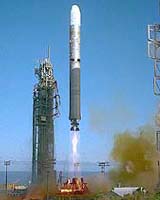
CHANNELS

SERVICES
SPACEDAILY
EXPRESS
June 24, 2002
Add SpaceDaily headlines to your site automatically FREE SPACE |
Advertise Here
|
 June 24, 2002 June 24, 2002 Titan 2 Lofts NOAA Bird
Titan 2 Lofts NOAA Bird

Titan 2 seconds after ignition |
Sunnyvale - June 24, 2002
A Titan 2 has launched NOAA-M, the latest US weather satellite, into a polar orbit. Launch was at 11:23am PST (1822 GMT) from Vandenberg Air Force Base in Californina. Both the rocket and satellite were built by Lockheed Martin companies. NOAA-M is the third Polar Operational Environmental Satellite (POES) spacecraft launched. After an on-orbit verification period that lasts 45 days, NASA will turn operational control of the satellites over to NOAA.
Gilat Dominating Indian VSAT Market
 Petah Tikva - June 18, 2002
Petah Tikva - June 18, 2002
Gilat Satellite Networks Ltd. has expanded its business operations in India to the point of being India's leading VSAT provider. According to the May 2002 issue of India's Voice & Data magazine, Gilat captured nearly 70 percent of the market for Time Division Multiple Access (TDMA) VSATs for the period April 2001 through March 2002.
Where Have All The Comets Gone?
 Boulder - June 20, 2002
Boulder - June 20, 2002
Most comets disintegrate after their first few passages through the inner solar system, say scientists at Southwest Research Institute (SwRI). A new study has revealed that 99 percent of the objects from the cloud of comets at the edge of the solar system, known as the Oort cloud, break apart sometime after they enter the inner solar system. The findings appear in the current issue of the journal Science.
Remains Of A Planet Still Born Remain Scared In Time
 Washington - Jun 24, 2002
Washington - Jun 24, 2002
Geologists at the Smithsonian's National Air and Space Museum have discovered a large former lake in the highlands of Mars that would cover an area the size of Texas and New Mexico combined, and which overflowed to carve one of that planet's largest valleys. The findings will appear in the June 21 issue of the journal Science.
Rocket Science Gets A Boost At Florida
 Gainesville - Jun 20, 2002
Gainesville - Jun 20, 2002
NASA has chosen the University of Florida as the lead institution in a nearly $16 million research initiative aimed at making space flight as routine, inexpensive and safe as commercial air travel.
Miss yesterday's edition? Then stop by The Daily Archive
|
|
 A Month Of Jovian Exploration
A Month Of Jovian Exploration
June 17 - July 14, 2002
 The Galileo spacecraft has now rounded the corner in its longest looping orbit around Jupiter and is again heading back in towards the giant planet and a close flyby of the tiny moon Amalthea in November. The Galileo spacecraft has now rounded the corner in its longest looping orbit around Jupiter and is again heading back in towards the giant planet and a close flyby of the tiny moon Amalthea in November.
Afghan Ops Bolster UAV Market
 Newtown - June 19, 2002
Newtown - June 19, 2002
Allied operations in Afghanistan will have a positive influence on the unmanned air vehicle (UAV) market, with production over the next ten years expected to be worth $7.5 billion, according to Forecast International's "The Market for Reconnaissance Unmanned Air Vehicles."
Endeavour Back On Deck
Edwards - Jun 19, 2002
 The US space shuttle Endeavour landed Wednesday at Edwards Air Force Base in California after a two-day delay, ending an almost 15-day mission to the International Space Station (ISS). Endeavour touched down at Edwards at 10:58 am (1758 GMT), under the blue skies of the Mojave desert, according to a NASA broadcast of the landing. The US space shuttle Endeavour landed Wednesday at Edwards Air Force Base in California after a two-day delay, ending an almost 15-day mission to the International Space Station (ISS). Endeavour touched down at Edwards at 10:58 am (1758 GMT), under the blue skies of the Mojave desert, according to a NASA broadcast of the landing.
|












